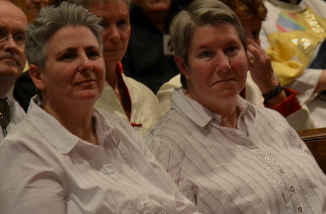Married and registered lesbian and gay couples in the
European Union now enjoy the same pension rights as their heterosexual
counterparts.
Last week, the Court of Justice ruled that same-sex partners
must be “treated equally to married partners.”
The judgment confirmed that the “difference of treatment
between registered partners and married partners constitutes direct
discrimination on the ground of sexual orientation.”

The case came before the courts after the German city of
Hamburg refused to grant equal rights to a gay couple who were in a legal civil
partnership.
Pension funds and other retirement benefit providers across
the EU may be obliged to provide larger or back-dated payments to same-sex
civil union partners.
The same thing happened here in Canada in 2007. The Supreme
Court struck down provisions in the Canada Pension Plan (CPP) that
discriminated against same-sex couples. The court ruled that the CPP had to pay
out back-dated survivor pensions.
After the recent elections, the future of pensions has
become a political talking point. The NDP party is pushing for reforms in the CPP — Layton wants a large
increase in pensions — while Harper will not commit either way.
So, where do same-sex couples stand with regard to pensions?
I found an interesting map on CBC that lists benefits given
under provincial laws to married same-sex couples. Here’s a brief glance:
Ontario: rights to medical decision-making, workers’
compensation, insurance and pension benefits, protection under fatal-injury
laws, recognition under conflict-of-interest laws.
Manitoba: survivors’ benefits, pension benefits, workers’
compensation, rights to medical decision-making.
Saskatchewan: spousal support, matrimonial property
division, inheritance, insurance and pension benefits.
Alberta: estate inheritance.
British Columbia: partners in public sector allowed pension
benefits, medical decision-making.
Yukon: spousal benefits, matrimonial property division.
Northwest Territories: equal workplace benefits, spousal
support, matrimonial property division.
Nunavut: same as Northwest Territories.
Newfoundland and Labrador: pension benefits, workers’
compensation, power of attorney.
PEI: spousal support.
Nova Scotia: provincial employees allowed workplace and
pension benefits, spousal support, matrimonial property division, rights to
medical decision-making.
New Brunswick: spousal support benefits.
Quebec: spousal support, matrimonial property division,
medical decision-making, workers’ compensation, pension benefits, presumption of
parental rights.
 Why you can trust Xtra
Why you can trust Xtra


